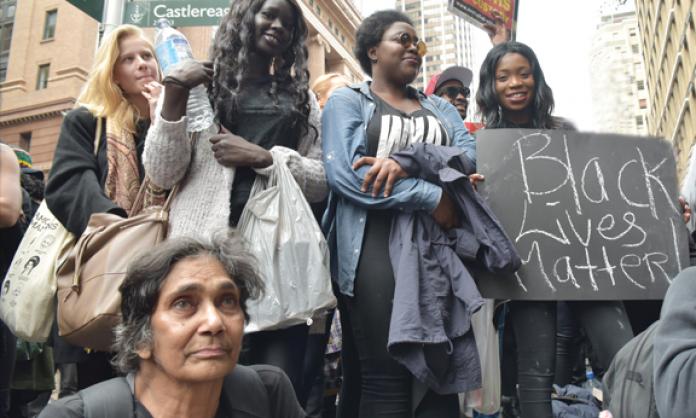Tens of thousands of people have taken to the streets in Britain, Ireland, the Netherlands, South Africa, Germany and Australia in the wake of the police murders of Philando Castile and Alton Sterling in the US in early July.
In Australia, Black Lives Matter solidarity actions drew attention to police violence and high levels of institutionalised racism faced by African Americans and other people of colour in the USA, and by the Aboriginal and Torres Strait community in Australia.
The political right was quick to denounce the rallies. Murdoch favourites Andrew Bolt and Tom Elliot wrote that taking a stand against racism is divisive. Elliot, in a 14 July Herald Sun article about the Melbourne rally, lectured that we should “stop dividing people by race” because “all lives matter equally”.
Bolt has informed us that the real victims of racism in both the USA and Australia are white people like him. According to Bolt, Aboriginal people are poorer, sicker and jailed more than non-Indigenous Australians because in both the USA and Australia there is “a dysfunctional and brutal Black popular culture that celebrates a reverse racism and victimhood”.
The problem, according to both Bolt and Elliot, is not that systemic and institutionalised racism exists, but that we won’t shut up about it.
The starting point for Bolt, Elliot and others of their ilk is an unshakable belief that society is some sort of non-racialised level playing field. Nothing could be further from the truth.
In the USA, more than 1 million people of colour are currently in prison. They make up almost half of the total prison population. According to statistics gathered by the Washington Post since early 2015, an unarmed black person is five times more likely to be killed by a police officer than an unarmed white person. While the same level of gun deaths and shootings by police is not taking place in Australia, Indigenous Australians continue to be jailed at an alarming rate, and deaths in custody continue to occur due to systemic and institutionalised racism.
According a 2011 Australian Institute of Criminology report, Aboriginal and Torres Strait Islanders make up 19 percent of all deaths in custody across Australia. These deaths are a result of a combination of police brutality and structural violence.
Just over half of the Indigenous deaths are a result of serious health issues, revealing the failure of police and prisons in their duty of care. The case of Ms Dhu in Western Australia is a prime example. Arrested in 2014 for unpaid fines, she was in serious distress due to a broken rib sustained in a domestic violence incident, but police refused to believe it. Instead, they declared she was just an attention-seeking “junkie” who was “faking it”. She died in custody.
Black deaths in custody continue to be an issue primarily because of the over-policing of Indigenous communities. Aboriginal and Torres Strait Islander people are being arrested and jailed primarily for “public order” offences such as drunkenness, offensive language, vandalism and petty theft.
Aboriginal people are imprisoned at 13 times the rate of non-Indigenous Australians. In the last 15 years, the incarceration of Indigenous women has risen 74 percent, and Aboriginal and Torres Strait Islander children are 24 times more likely to be jailed than non-Indigenous children. Indigenous youth are more than 50 percent of those in juvenile detention.
According to a 2015 Amnesty International report, Aboriginal youth in Western Australia are “53 times more likely than their non-Aboriginal peers to be in detention”. This is the highest rate of detention of Aboriginal young people anywhere in Australia. Among Aboriginal male youth, one in every 77 is in detention at any given time.
Black lives matter, in both Australia and the USA. Pointing that out is both necessary and urgent.




